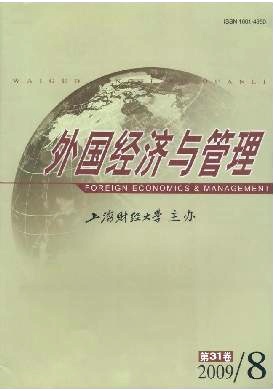企业高管薪酬规制理论研究:动因、实践与启示
外国经济与管理 2009 年 第 31 卷第 08 期, 页码: - 27
摘要
参考文献
摘要
现实生活中,企业高管薪酬实践受到来自政府及相关机构税收、会计和信息披露等方面政策的制约和影响。由本次国际金融危机引发的全球"限薪"浪潮,使得企业高管薪酬治理带有越来越浓厚的政府规制色彩。本文主要对企业高管薪酬规制的动因、全球实践和主要效应进行了深入的理论分析,进而对如何提升政府薪酬规制效率这个问题进行了思考。
[1]Jensen,M,and meckling,W.Theory of the firm:Managerial behavior,agency cost,and capital structure[J].Journal of Political E-conomy,1976,3(4):305-360.
[2]Dew-Becker,Ian.How much sunlight does it take to disinfect a boardroom?Ashort history of executive compensation regulation?[R].NBER Working Paper,No.14145,2008.
[3]Jensen,Michael C,and Kevin J Murphy.Performance pay and top-management incentives[J].Journal of Political Economy,1990,98(4):225-264.
[4]Bebchuk,Lucian A,and Jessie Fried.Pay without performance:The unfulfilled promise of executive compensation[M].Cambridge,MA:Harvard University Press,2004.
[5]Mullane,Joy Sabino.Incidence and accidents:Regulation of executive compensation through the tax code[J].Working Paper,Vil-lanova University,No.2009-07,2009.
[6]Bebchuk,Lucian,and Jesse Fried.Executive compensation as an agency problem[J].Journal of Economic Perspectives,2003,17(1):71-92.
[7]Murphy,Kevin J.Politics,economics,and executive compensation[J].University of Cincinnati Law Review,1995,63(6):713-748.
[8]黄再胜.企业经理报酬决定理论:争论与整合[J].外国经济与管理,2005,27(8):33-40.
[9]Bebchuk,Lucian,and Jesse Fried.Executive compensation at Fannie Mae:Acase study of perverseincentives,nonperformance pay,and camouflage[J].Journal of Corporation Law,2005,30(4):807-822.
[10]Jensen,Michael C,Kevin J Murphy,and Eric G Wruck.Remuneration:Where we’ve been,how we got to here,what are theproblems,and howto fix them[R].Harvard Business School NOM Research Paper,No.04-28,2005.
[11]Hall,Brian J,and Jeffrey B Liebman.The taxation of executive compensation[J].Tax Policy and Economy,2000,14(1):1-44.
[12]Lo,Kin.Economic consequences of regulated changes in disclosure:The case of executive compensation[J].Journal of Accountingand Economics,2003,35(3):285-314.
[13]Swan,Peter L,and Xianming Zhou.Does executive compensation disclosure alter pay at the expense of incentives?[J].WorkingPaper,University of New South Wales,2006.
[14]Balachandran,Sudhakar,Fabrizio Ferri,and David Maber.Solving the executive compensation problemthrough shareholder votes?Evidence fromthe UK[R].Working Paper,Harvard Business School,2007.
[15]Perry,T,and MZenner.Pay for performance,government regulation and the structure of compensation contracts[J].Journal ofFinancial Economics,2001,62(3):453-488.
[16]Jarque,Arantxa.CEOcompensation:Trends,market changes,and regulation[J].Economic Quarterly,2008,94(2):265-300.
[17]Cohen,Daniel A,Aiyesha Dey,and Thomas Z Lys.The Sarbanes Oxley Act of 2002:I mplications for compensation contracts andmanagerial risk-taking[R].Working Paper,New York University,2007.
[2]Dew-Becker,Ian.How much sunlight does it take to disinfect a boardroom?Ashort history of executive compensation regulation?[R].NBER Working Paper,No.14145,2008.
[3]Jensen,Michael C,and Kevin J Murphy.Performance pay and top-management incentives[J].Journal of Political Economy,1990,98(4):225-264.
[4]Bebchuk,Lucian A,and Jessie Fried.Pay without performance:The unfulfilled promise of executive compensation[M].Cambridge,MA:Harvard University Press,2004.
[5]Mullane,Joy Sabino.Incidence and accidents:Regulation of executive compensation through the tax code[J].Working Paper,Vil-lanova University,No.2009-07,2009.
[6]Bebchuk,Lucian,and Jesse Fried.Executive compensation as an agency problem[J].Journal of Economic Perspectives,2003,17(1):71-92.
[7]Murphy,Kevin J.Politics,economics,and executive compensation[J].University of Cincinnati Law Review,1995,63(6):713-748.
[8]黄再胜.企业经理报酬决定理论:争论与整合[J].外国经济与管理,2005,27(8):33-40.
[9]Bebchuk,Lucian,and Jesse Fried.Executive compensation at Fannie Mae:Acase study of perverseincentives,nonperformance pay,and camouflage[J].Journal of Corporation Law,2005,30(4):807-822.
[10]Jensen,Michael C,Kevin J Murphy,and Eric G Wruck.Remuneration:Where we’ve been,how we got to here,what are theproblems,and howto fix them[R].Harvard Business School NOM Research Paper,No.04-28,2005.
[11]Hall,Brian J,and Jeffrey B Liebman.The taxation of executive compensation[J].Tax Policy and Economy,2000,14(1):1-44.
[12]Lo,Kin.Economic consequences of regulated changes in disclosure:The case of executive compensation[J].Journal of Accountingand Economics,2003,35(3):285-314.
[13]Swan,Peter L,and Xianming Zhou.Does executive compensation disclosure alter pay at the expense of incentives?[J].WorkingPaper,University of New South Wales,2006.
[14]Balachandran,Sudhakar,Fabrizio Ferri,and David Maber.Solving the executive compensation problemthrough shareholder votes?Evidence fromthe UK[R].Working Paper,Harvard Business School,2007.
[15]Perry,T,and MZenner.Pay for performance,government regulation and the structure of compensation contracts[J].Journal ofFinancial Economics,2001,62(3):453-488.
[16]Jarque,Arantxa.CEOcompensation:Trends,market changes,and regulation[J].Economic Quarterly,2008,94(2):265-300.
[17]Cohen,Daniel A,Aiyesha Dey,and Thomas Z Lys.The Sarbanes Oxley Act of 2002:I mplications for compensation contracts andmanagerial risk-taking[R].Working Paper,New York University,2007.
引用本文
黄再胜. 企业高管薪酬规制理论研究:动因、实践与启示[J]. 外国经济与管理, 2009, 31(8): 0–27.
导出参考文献,格式为:
上一篇:组织间关系的社会逻辑观评介





 6739
6739  320
320

